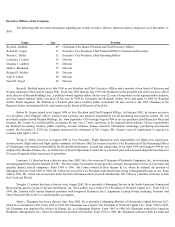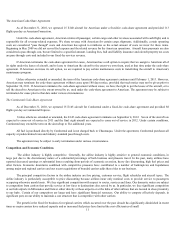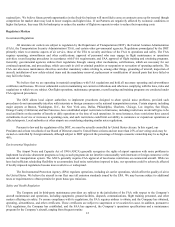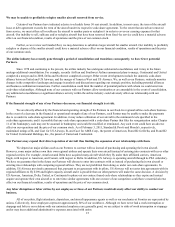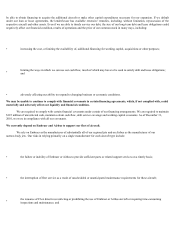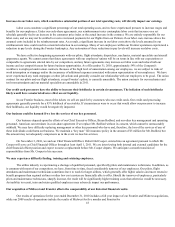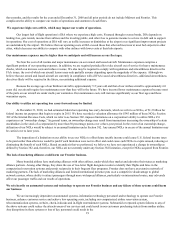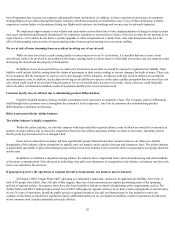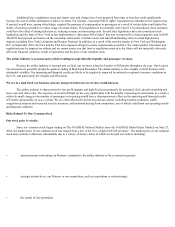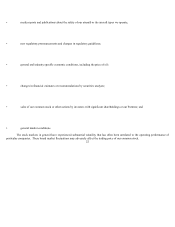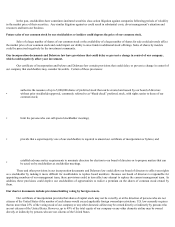Frontier Airlines 2010 Annual Report Download - page 22
Download and view the complete annual report
Please find page 22 of the 2010 Frontier Airlines annual report below. You can navigate through the pages in the report by either clicking on the pages listed below, or by using the keyword search tool below to find specific information within the annual report.We may be unable to profitably redeploy smaller aircraft removed from service.
Certain of our Partners have indicated a desire to schedule fewer 50 seat aircraft. In addition, in most cases, the term of the aircraft
lease or debt agreement exceeds the term of the aircraft under its respective code-share agreement. To the extent that aircraft are removed
from service, we must either sell or sublease the aircraft to another party or redeploy it in order to cover our carrying expenses for that
aircraft. Our inability to sell, sublease and/or redeploy aircraft that have been removed from fixed-fee service could have a material adverse
effect on our financial condition, results of operations and the price of our common stock.
Further, as we review our branded fleet, we may determine to substitute larger aircraft for smaller aircraft. Our inability to profitably
redeploy or dispose of the smaller aircraft could have a material adverse effect on our financial condition, results of operations and the price
of our common stock.
The airline industry has recently gone through a period of consolidation and transition; consequently, we have fewer potential
Partners.
Since 1978 and continuing to the present, the airline industry has undergone substantial consolidation, and it may in the future
undergo additional consolidation. For example, recently AirTran and Southwest Airlines announced plans to merge, Continental and United
completed a merger and in 2008, Delta and Northwest completed a merger. Other recent developments include the domestic code-share
alliance between United and US Airways, and the merger of America West and US Airways. We, as well as our Partners, routinely monitor
changes in the competitive landscape and engage in analysis and discussions regarding our strategic position, including potential alliances
and business combination transactions. Further consolidation could limit the number of potential partners with whom we could enter into
code-share relationships. Although none of our contracts with our Partners allow termination or are amendable in the event of consolidation,
any additional consolidation or significant alliance activity within the airline industry could adversely affect our relationship with our
Partners.
If the financial strength of any of our Partners decreases, our financial strength is at risk.
We are directly affected by the financial and operating strength of the Partners in our fixed-fee regional airline code-share business.
In the event of a decrease in the financial or operational strength of any of our Partners, such Partner may be unable to make the payments
due to us under its code-share agreement. In addition, it may reduce utilization of our aircraft to the minimum levels specified in the
code-share agreements, and it is possible that any code-share agreement with a code-share Partner that files for reorganization under Chapter
11 of the bankruptcy code may not be assumed in bankruptcy and could be modified or terminated. Any such event could have an adverse
effect on our operations and the price of our common stock. As of February 3, 2011, Standard & Poor's and Moody's, respectively,
maintained ratings of B- and Caa1 for US Airways, B- and Caa1 for AMR Corp., the parent of American, B and B2 for Delta, and B and B2
for United Continental Holdings, Inc., the parent of United and Continental.
Our Partners may expand their direct operation of aircraft thus limiting the expansion of our relationships with them.
We depend on major airlines such as our Partners to contract with us instead of purchasing and operating their own aircraft.
However, some major airlines own their own regional airlines and operate their own aircraft instead of entering into contracts with us or other
regional carriers. For example, American and Delta have acquired many aircraft which they fly under their affiliated carriers, American
Eagle, with respect to American, and Comair, with respect to Delta. In addition, US Airways is operating aircraft through its PSA subsidiary.
We have no guarantee that in the future our Partners will choose to enter into contracts with us instead of purchasing their own aircraft or
entering into relationships with competing regional airlines. They are not prohibited from doing so under our code-share agreements. In
addition, US Airways previously announced that, pursuant to an agreement with its pilots, US Airways will not enter into agreements with its
regional affiliates to fly E190 and higher capacity aircraft and it is possible that our other partners will make the same decision. A decision by
US Airways, American, Delta, United, or Continental to phase out our contract based code-share relationships as they expire and instead
acquire and operate their own aircraft or to enter into similar agreements with one or more of our competitors could have a material adverse
effect on our financial condition, results of operations and the price of our common stock.
Any labor disruption or labor strikes by our employees or those of our Partners would adversely affect our ability to conduct our
business.
All of our pilots, flight attendants, dispatchers, and aircraft appearance agents as well as our mechanics at Frontier are represented by
unions. Collectively, these employees represent approximately 54% of our workforce. Although we have never had a work interruption or
stoppage and believe our relations with our unionized employees are generally good, we are subject to risks of work interruption or stoppage
and/or may incur additional administrative expenses associated with union
15



